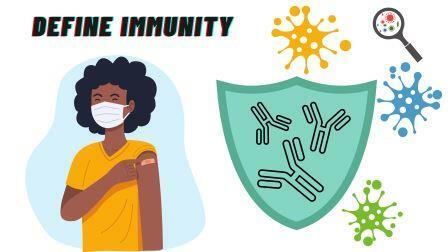Q- Define Immunity
Answer- Immunity refers to the strength of the body of an organism to defend against any foreign microbe. It is a complex biological system endowed with the capacity to tolerate and recognize the foreign microbes in the body and kill them out to protect the organism from getting infected by any kind of external microbe.
The above answer is completed and we hope this answer will help you a lot to define immunity in a few words. This question is important for students of class 9th and who are preparing for medical exams. Now, in the rest of the portion of this article, we are going to help you will some more detailed description of the term Immunity. This will help you to define immunity in your examination and learn it for your knowledge.
Immunity
Immunity is a very deep and big topic of discussion. As we previously told you that immunity is the strength of the body of an organism to defend against any foreign microbe. We can define immunity as a complex biological system that has the capacity to recognize the foreign particles (microbes) in an organism’s body and kill it to protect the whole body. Immunity is such as huge topic that has worthy of an encyclopedia of its own. In this article, we cannot summarize the whole detailed description of immunity, but we will identify key concepts of Immunity in little detail.

The word ‘immunity’ is very common in biology but its meaning and definition are quite complex. The term ‘Immunity’ was derived from the Latin word ‘immunitas’, the legal status of Roman city-states granted immunity from paying tributes to Rome or to individuals freed from municipal duties as the root munis referring to change and exchangeable goods.
In the above table of content, you can see all the headlines of the topics that we are going to cover below one by one. This will help you read the interested part of it.
Types of Immunity
There are different types of Immunity that are defined on the basis of different specifications and functions. So, here we are going to cover the two main types of Immunity. The names of these two types of immunity are as follows:
- Active Immunity
- Passive Immunity
1. Active Immunity: It can be defined as the immunity to a pathogen that occurs following exposure to all or part of that pathogen.
2. Passive Immunity: Passive immunity is defined as a kind of protection from a disease-causing microbe that is provided by antibodies of our immune system.
History behind Immunity
The Latin word ‘immunitas’ is the direct origin of the legal meaning of ‘immunity from prosecution, but, in the first century, Lucan (De Bello Civile) had metaphorically used this word to describe the Psylli of North Africa as immune to the bites of different venomous snakes. Biological immunity can refer to a constitutive physical innate mechanism, such as the physical protection afforded against infection by skin, they work as natural killer cells that recognize the foreign microbe and then kill it to protect the body from its effect.
The origins of immunology as science are lost in antiquity but have always been connected fundamentally with the roots of microbiology. It was certainly known before the beginning of the Common Era that survivors of certain plagues (smallpox) were immune to its recurrence.
To define immunity properly we first need to know the history behind it that is why in the above heading, we told you about the history of the term Immunity but in it, we didn’t describe it a lot as it is a very deep topic so in this case, we described it a little that will be sufficient for you.
Keyword- Define Immunity
